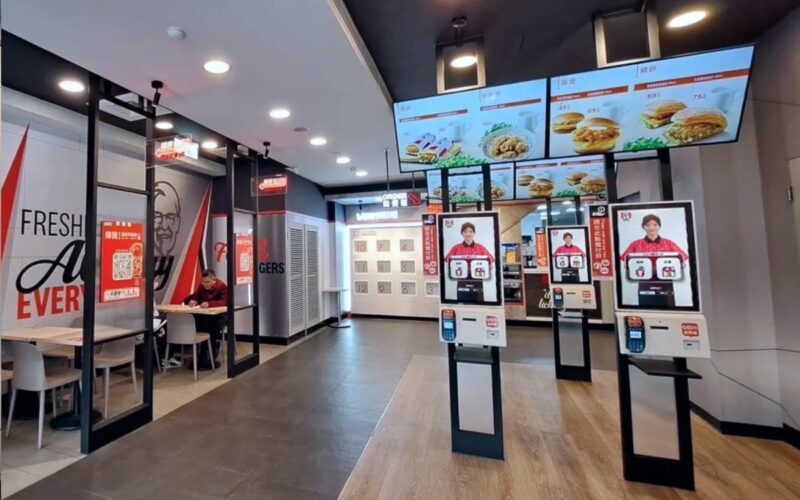Bangkok | The interaction between customers and digital signage screens is not only becoming more personal but also more human. While personalization has long been standard in mobile apps, the one2many medium of digital signage is quickly catching up. In addition, AI-based digital humans provide digital signage touchpoints a more personal touch, more hospitality and enable more efficient transactions.

Infocomm Asia: AI with a human touch
Digital signage-based order terminals have revolutionized quick service restaurants: the ordering process has become faster, user satisfaction is higher and customers order more. But the user experience is not yet optimal because the dialogue follows a predetermined grid and is not based on the user’s personal wishes.
The AI startup Pantheon Labs has set out to improve the user experience at the PoS and PoI with Digital Humans. Initial projects are showing positive results. At the Infocomm Asia Digital Signage Conference in Bangkok organized by invidis, the digital signage AI startup from Hong Kong presented the potential and project results of digital humans in QSR, public transport and with service providers.

Improving the service experience
Pantheon is taking a refreshing approach to improving interaction on kiosks screens with digital humans. One of the first customers is Yam Foods / KFC in Taiwan, which has added Kala to its order terminals.
Kala is not a boring avatar, but is based on photos of 400 restaurant employees from KFC in Taiwan. With the help of AI, not just any avatar was created, but a digital human that represents the employees, conveys hospitality and with whom restaurant guests enjoy interacting.
Kala is designed to communicate precisely and sensitively and imitates the natural rhythm of human speech, lip synchronization and gestures in order to improve the customer service experience. The digital human supports guests throughout the entire ordering process and also enables them to make decisions independently and thus personalize the given ordering process.
Kala is already proving its worth in everyday restaurant life – guests at KFC Taiwan interact with the order terminals in a natural way, share their personal preferences and have recommendations made. As is usual with AI, the quality increases measurably over the course of the project. Since April 2024, KFC Taiwan has been using Kala as part of the Restaurant 2.0 strategy with very positive guest feedback.
For KFC, the current service-supporting use is just the beginning. In the future, ordering and collection should be able to be carried out completely autonomously and contactlessly. The aim is to expand Kala’s functionality with a direct ordering system in order to refine customer interaction with efficiency and genuine warmth.
The all-knowing language genius in public transport
Pantheon is also providing digital humans to transit customers. Various transit providers in Hong Kong and Singapore are using Pantheon Lab’s digital humans for connection information, lost & found and route guidance in and outside the stations. At busy metro stations such as in Hong Kong, 300 passengers use the digital human touchpoint every day.
Pantheon activates the microphone as soon as a user approaches the screen to automatically recognize the language. In addition to the official languages of Cantonese and Mandarin in Hong Kong and the four official languages in Singapore, there are also the many languages spoken by millions of tourists in the cities.
As soon as the language is recognized, the digital human communicates in a way that is understandable to the user and offers its information services. Frequently asked questions can be answered immediately thanks to Edge AI, while more “exotic” questions take a moment for the cloud-based large language model to generate the information. The learning curve is very steep as the system quickly builds up a wealth of knowledge of the most frequently asked topics.
Digital Humans enable more human communication with digital signage touchpoints. Currently still as a digital layer on existing applications, but in the future also fully integrated. With Digital Humans, Pantheon Lab is targeting service and hospitality scenarios in particular, where today the quality of service and hospitality suffers due to a lack of employees or less experienced employees.

